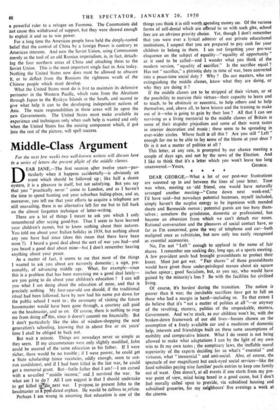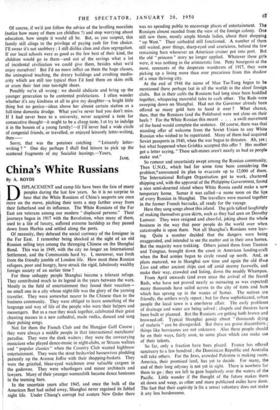Middle-Class Argument
For the next few week's two well-known writers will discuss here In a series of letters the present plight of the middle classes.
DEAR JANE,—The first reunion after twelve years—par- ticularly when it happens accidentally—is obviously an event which should be followed up ; like half a dozen oysters, it is a pleasure in itself, but not satisfying. But you say that you " practically never " come to London, and as I haven't the time to spend hunting out your suburban hiding-place, and as, moreover, you tell me that your efforts to acquire a telephone are- still unavailing, there is no alternative left for me but to fall back on the almost forgotten technique of letter-writing.
There are a lot of things I meant to ask you which I only remembered after saying good-bye. Thus I seem to have learned your children's names, but to know nothing about their natures. You told me about your Italian holiday in 1939, but nothing about any you have had since (does this mean that there have been none 7). I heard a good deal about the sort of war you had—and you heard a good deal about mine—but,I don't remember hearing anything about your peace.
As a matter of fact, it seems to me that most of the things I wanted to ask you about are narrowly domestic ; a sign, pre- sumably, of advancing middle age. What, for example—since this is a problem that has been exercising me a good deal lately— are you going to do about your children's education ? I can tell you what I am doing about the education. of mine, and that is precisely nothing. My four-year-old son should, if the traditional ritual had been followed, have by now had his name put down for the public school I went to ; the ceremony of visiting the future housemaster would have been gone through, a courtesy call paid on the headmaster, and so on. Of course, there is nothing to stop me from doing air this, since it doesn't commit me financially. But I don't particularly like the idea of window-shopping the next generation's schooling, knowing that in About five or six years' time I shall be obliged to back out.
But wait a minute. Things are nowadays never so simple as they seem. If my circumstances were only slightly modified, John could be assured of the same education as his father. If I were richer, there would be no trouble ; if I were poorer, he could get a State scholarship (since vacancies, oddly enough, seem to out- run candidates), and if I had been killed in the last war, he could get a memorial grant. But—futile father that I am!—I am cursed with a so-called " middle income," and (I survived the war. So what am I to do ? All I can suggest is that I should undertake to get killediittlie.next war. I propose_to present John to the headmaster asrPosi-dated orphan. He would be Callous to refuse.
Perhaps I am wrong in assuming that education is one of the
things you think it is still wort_ spending money on. Of the various forms of self-denial which are offered to us with such glee, school fees are an obvious priority choice. Yet, though I don't remember that you were ever a lyrical admirer of our private educational institutions, I suspect that you are prepared to pay cash for your children to belong to them. I am not forgetting your pre-war eloquence on the subject of equality—" equality of opportunity " as it used to be called-rand I wonder what you think of the modern version, " equality of sacrifice." Is the sacrifice equal ? Has not " sacrifice," a pUtriotic duty in time of war, been converted into a peace-time social duty ? Why ? Do our masters, who are extinguishing the middle classes, know what they are doing, or why they are doing it ?
If the middle classes are to be stripped of their virtues, or of the possibility to exercise their virtues—their capacity to learn and to teach, to be obstinate or eccentric, to help others and to help themselves, and, above all, to have leisure and the training to make use of it—who is going to gain by their loss ? All that I can see surviving as a living memorial to the middle classes of Britain is some of ,their stupider prejudices and some of their worst tastes in interior decoration and music ; these seem to be spreading in ever-wider circles. Whose fault is all this ? Are you still " Left " enough for me to be able to lay some of the blame at your door ? Or is it not a matter of politics at all ?
This letter, at any rate, is prompted by our chance meeting a couple of days ago, and not by the news of the Election. And I like to think that it's a letter which you won't leave too long unanswered.—Yours, GEORGE.
* * * * DEAR GEORGE,—What a lot of our post-war frustrations are summed up in and between the lines of your letter. Time was when, meeting an 'old friend, one would have naturally arranged another meeting—" Come down next week-end," I'd have said—but nowadays potential hostesses, myself included, simply haven't the surplus energy to be ingenious with mended sheets and Barmecide menus ; potential guests are too busy them- selves ; somehow the grindstone, domestic or professional, has become an obsession from which we can't detach our noses. Rational conversation and the pleasures of social contact have, so far as I'm concerned, gone the way of telephone and car--both maligned once as substitutes, but now only too easily recognised as essential accessories.
No, I'm not " Left " enough to applaud in the name of fair shares. I remember one soaking day, long ago, at a sports meeting. A few provident souls had brought groundsheets to protect their knees. Most just got wet. " Fair shares " of those groundsheets would have given those under-privileged masses about six square inches apiece ; good Socialism, but, as you say, who would have gained by the minority's loss ? So with the facilities for civilised living.
Of course, it's hardest' during the transition. The nation is poorer than it was; the inevitable sacrifices have got to fall on those who had a margin in hand—including us. To that extent I do believe that it's " not a matter of politics at all "—or anyway of the revolting, etcetera, politics of the unspeakable, etcetera, Government. And we're stuck, as our children won't be, with the broken-down framework of our old lives—houses chosen on the assumption of a freely available car and a modicum of domestic help, interests and friendships built on these same assumptions of mobility and comparative leisure. What I do resent is not being allowed to make what adaptations I can by the light of my own wits to fit my own tastes ; the sumptuary laws, the ineffable moral superiority of the experts deciding for us what's " essential " and virtuous, what " inessential " and anti-social. Also, of course, the spectacle of our magnificent but cock-eyed social services—like the food subsidies paying nine families' pools entries to keep one family out of want. One doesn't, at all events if one starts from my pre- war point of view, mind being taxed in a good cause, but I don't feel morally called upon to proyide, via subsidised housing and subsidised groceries, for my neighbours' five evenings a week at the cinema. Of course, if we'd just follow the advice of the levelling moralists (notice how many of them are childless ?) and stop worrying about education, how simple it would all be. But, as you suspect, this family still clings to the privilege of paying cash for free choice. I'll swear it's not snobbery ; I still dislike class and class segregation. If our local schools were as good as the few best of their kind, the children would go to them—and out of the savings what a lot of incidental civiliiation we could give them, besides what we'd enjoy ourselves! But I'd no more inflict on them the huge classes, the uninspired teaching, the dreary buildings and crushing medio- crity which are still too typical than I'd feed them on skim milk or cram their feet into too-tight shoes.
Possibly we're all wrong ; we should abdicate and bring up the younger generation to be contented proletarians. I often wonder whether it's any kindness at all to give my daughter—a bright little thing but no genius—ideas above her almost certain station as a full-time domestic drudge. What you've never had you don't miss. If I had never been to a university, never acquired a taste for consecutive thought—it ought to be a cheap taste, t ut try to indulge it in the bosom of a young family!—if I'd never had a wide circle of congenial friends, or travelled, or enjoyed leisurely letter-writing, then— Sorry, that was the potatoes catching. ' " Leisurely letter- writing ? " One day perhaps I shall find leisure to pick up the scattered fragments of my Socialist leanings.—Yours,
JANE,



































 Previous page
Previous page